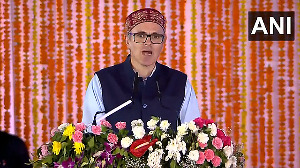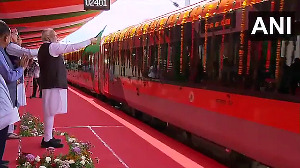The net loss for the quarter ending June 30 is Rs 110.26 crore (Rs 1.10 billion), by which date the airline had eroded over half its net worth (Rs 593 crore).
Deccan Aviation, the company that runs the airline, posted a net loss of Rs 230.29 crore (Rs 2.30 billion) in 2005-06, up from Rs 19.53 crore (Rs 195.3 million) in 2004-05. The company had a turnover of Rs 1,352 crore (Rs 13.52 billion) during the 15 months to June 2006.
Air Deccan is, however, raising $100 million from a consortium of banks for capital expenditure. The money will come in four tranches over the next 15 months.
"The actual loss is shocking. Deccan Aviation's loss estimates for 2005-06 were Rs 150 crore (Rs 1.5 billion) and for the 15-month period Rs 200 crore (Rs 2 billion). The figures are disturbing," said an aviation analyst with a leading
equities firm.
"Air Deccan's mixed fleet and the pace of expansion have impacted its profitability. Maintaining two types of aircraft incurs extra crew and maintenance costs. Rather than consolidating, Air Deccan has drawn up a huge expansion plan," pointed out Siddhant Sharma, chairman of rival budget airline SpiceJet.
SpiceJet posted a net loss of Rs 41 crore (Rs 410 million) in 2005-06, after making a Rs 17 crore (Rs 170 million) profit on the sale and lease back of aircraft.
"This (Air Deccan's) is an unsustainable loss. However, any company will need time to build an airline. Ultimately, there should be synchronisation between the business model and the market," said Jeh Wadia, managing director of another low-cost airline, GoAir.
Air Deccan executives attributed the loss mainly to the rise in fuel and input costs, induction of 20 aircraft and the addition of 56 new routes.
Fuel costs have risen from 35 per cent of the airline's total cost in April 2005 to 46 per cent now, which it has not passed on to customers for most of the year.
"With a fleet of 34 aircraft and 55 destinations on June 30, 2006, the airline carried over 4.4 million passengers, and emerged as the second largest airline with a market share of 21.2 per cent in June," an Air Deccan statement said.
The Deccan Aviation scrip on Friday declined by 1.90 per cent on the Bombay Stock Exchange to Rs 105.75 from Thursday's close of Rs 107.80.
Capt G R Gopinath, managing director, Deccan Aviation, said: "Losses are bound to happen during the initial years. We are trying to make a tectonic change by shifting people from travelling by train to flying."
Mohan Kumar, director (finance), Deccan Aviation, said the company would continue to make losses till 2008-09 as it expands furiously.
"We have had robust growth in our seat factor, averaging 85 per cent in the peak seasons. However, the benefits of higher yields on the newer routes, which account for over 58 per cent of all routes now, will flow in the next few quarters," he added.
Kumar said in 2005-06 they had 238 flights a day, of which only 30 per cent made money. In 2007-08, the number of flights would go up to around 370 flights a day and he hopes about 45-50 per cent of them would make money.
"You need about 65-70 per cent of your flights to make money, then you can make profits."







